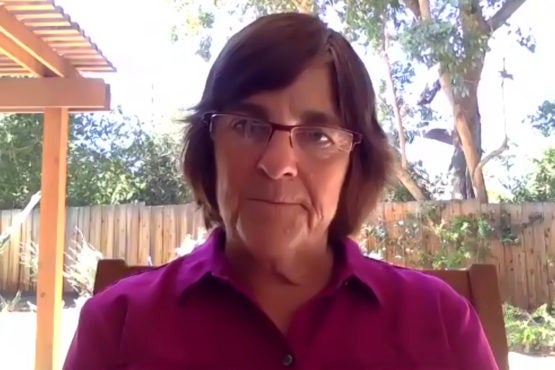One-year delay in unit cap on undergraduate majors approved
The Steering Committee of the Faculty Senate approved a one-year delay on a new academic policy – which had been scheduled to go into effect in the 2020-21 academic year – setting a 100-unit cap on undergraduate majors.
The Steering Committee of the Faculty Senate, acting in administrative session on behalf of the full senate, on Thursday approved a request by the Schools of Engineering, Humanities and Sciences, and Earth, Energy and Environmental Sciences for a one-year delay implementing a new policy setting a 100-unit cap on undergraduate majors.

Jennifer Widom, dean of the School of Engineering, spoke in support of the request for the delay in instituting the unit-cap policy while departments are making curricular adjustments during the pandemic. (Image credit: Andrew Brodhead)
Under the proposal approved Thursday on a unanimous vote, the policy is now scheduled to go into effect in autumn quarter of the 2022-23 academic year. The delay will apply to all undergraduate majors in those three schools. The review period of six years set out in the original policy will also be delayed by one year.
The policy, which established a unit range of 60-100 units for undergraduate majors, was originally scheduled to go into effect in autumn quarter of the 2021-22 academic year, with limited exceptions for majors with accreditation requirements in engineering fields.
Speaking in support of the request for the delay, Jennifer Widom, dean of the School of Engineering, said engineering departments, like departments across campus, are now focused very intently on figuring out their course offerings for the 2020-21 academic year due to the significant disruptions caused by the COVID-19 pandemic.
“The recently announced four-quarter academic year, the staggered undergraduate enrollments and the online or hybrid format for courses is creating a huge effort for departments, and we expect that those increased challenges will go on throughout the year and into next summer, since that will be our fourth quarter,” said Widom, who is also a professor of computer science and of electrical engineering.
“The idea that these departments would also need to work hard on adjusting their curricula to meet the unit cap in the coming year is daunting. They would like to look at the unit cap in a thoughtful manner, and that is going to involve new courses, redesigned courses, new pathways and so on.”
She said delaying the unit-cap policy by one year will allow departments to have what they hope will be a year beyond the COVID crisis to work on the curricular adjustments.
Widom said the deans of the two other Stanford Schools that offer undergraduate degrees – Debra Satz, dean of the School of Humanities and Sciences, and Steve Graham, dean of the School of Earth, Energy and Environmental Sciences – support the proposal.
The reduced cap on units for majors, which was approved by the Faculty Senate in May, was designed to ensure that all undergraduate majors are open to all students, regardless of their pre-collegiate preparation, and to give students the time to explore the wide range of academic disciplines and opportunities available at Stanford.
The Academic Council held a special meeting on June 24 to discuss the policy, in response to a faculty petition requesting a “full and broad” discussion of the mandate.
